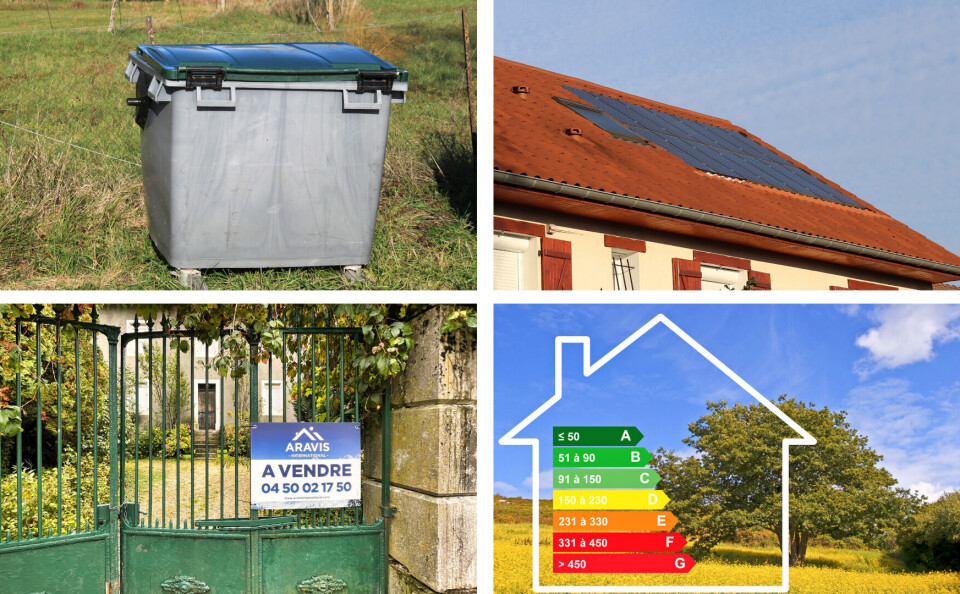-
Electricity bills to remain stable for most homes in France, says government
Significant rises are not forecast for customers on regulated tariffs in next two years
-
What changes in France for residents in November 2025?
EES checks rollout, energy bills, taxes, and winter rules: See what is changing in France next month
-
Dordogne electricity broker claims 8% savings for most clients
Service is free for customers – company earns commission from suppliers
Price negotiation, free electricity: Five French property updates
We also look at ownership rules after 30 years of non-contested use of a piece of land or property and efforts to sell Johnny Hallyday’s house

Commune can claim rights to a property after 30 years
The owner of a parcel of land which has been used as a public car park and waste bin area for 30 years has been told that the commune has a legal claim to its ownership.
A rule already exists relating to private individuals in such a case after 30 years but not for public authorities.
The Cour de cassation ruled on January 4 that as long as the commune has been using the land or property consensually the whole time, it can have it officially declared its own after three decades of uninterrupted, peaceful and public use.
The owner had argued that this is only possible for private individuals.
Read more: Do former tenants have a claim on our French house?
Indeed, in 2011 France’s then interior minister, Claude Guéant, had, in response to a question from another MP, insisted that this system of acquisition was not possible for a municipality.
He had based his argument on the fact that the Code général de la propriété des personnes publiques did not provide for it, reports Le Figaro.
However, nor does the code explicitly prohibit it, the Cour de cassation ruled, overturning an earlier judgement by the Court of Appeal in Aix-en-Provence in 2021 and referring the two parties to the Court of Appeal of Lyon.
The name of the commune has not been revealed.
A private individual can only claim right of ownership to land belonging to a commune on the basis of the same 30-year prescription trentenaire if it is in the private domain of the commune and not in the municipal public domain.
An example given is if a person fences off his land on which a rural path passes, which has not been classified as a communal road.
As long as he behaves as the owner of the path (i.e. maintains it himself) for 30 years and uses it continuously, without objection from the commune and in full view of everyone, he may be able to claim it legally.
Buyers can knock 6% off the price of a property
People looking to buy property in France can negotiate, on average, 6% off the price of a house or flat – the biggest room for manoeuvre since 2010.
The figure, which refers to prices at the end of 2022, has increased around 50% nationally over the past year, according to the LPI-SeLoger barometer.
Read more: Why French property prices are expected to fall 5-10% in 2023
The margin of negotiation measures the difference between the advertised price of a property when the mandat de vente is signed between the seller and estate agent, and the final sale price.
House prices tend to be more flexible, the statistics show, with a 6.4% margin compared to 5.6% for flats.
And you can knock the price down even more in rural regions, with margins of almost 9% on houses in Picardy, 7.42% in Lower Normandy and 7.18% in Nord-Pas-de-Calais.

However, the figures do not necessarily equate to increased purchasing power for buyers, warn experts.
"Access to credit has become considerably more difficult for households in recent months," Michel Mouillart, spokesman for the LPI-SeLoger barometer, told Capital.
While in December 2021 people could borrow €223,896 on average, by December 2022 that amount had fallen to €194,020.
People’s buying power is also affected by a rapid increase in the price of property over recent years, especially 2020 and 2021.
Homeowner shares surplus electricity with neighbours – for free
A homeowner in southern France is sharing surplus electricity from his solar panels with four neighbours – and not charging them a cent.
Christophe Brun, who lives in Simiane-Collongue, a village between Aix-en-Provence and Marseille, said the idea to redistribute electricity was a natural progression from sharing the glut of grapes from his vineyard with neighbours.
He told 20 Minutes: “We thought it would be interesting to try out free sharing, to see how it goes.”
He set up an association last July based on the Amap model (Association pour le maintien de l'agriculture paysanne – a partnership between a group of consumers and a farmer).
Electricity distribution service Enedis takes care of re-routing the surplus power from 16 solar panels on his roof, the only constraint being that the properties receiving it must be within a 2km radius of his house.
These households have already reported between 15% and 25% savings on their energy bills over the summer as a result.
Read more: Easy-fit French solar panels could cut electricity bill by €30 a month
Some neighbours have gifted Mr Brun jams from their garden in exchange for the electricity.
Julie Lacombe, co-founder of the association and a beneficiary of the scheme, told 20 Minutes: "Christophe consumes 80% of his production himself, the 20% he gives away represents a few hundred euros. For that price, he creates a community that is worth its weight in gold.”
Read more: Solar panels on French property: how to make your own electricity
The association hopes to roll out the initiative in other parts of France, and anticipates surplus electricity could in future be used to help people in fuel poverty and charity projects.
Houses with poor energy ratings are not flooding the property market, contrary to predictions
Rules banning poorly-insulated properties from being rented out have not yet seen their owners rush to sell them.
From January 1, people who own properties with an energy efficiency rating (diagnostic de performance énergétique) of G+ – the lowest score possible – and which consume over 450kWH per square metre per year, are no longer able to rent them out.
This rule will extend to all G-rated properties from 2025, all F-rated properties from 2028 and all E-rated properties from 2034.
Some experts had predicted that the law would see the market flooded with energy-inefficient properties as a result, but their share remained stable in most places in 2022, according to a study by the Guy Hoquet agency network and reported by Le Journal du Dimanche.
The study found that F and G properties put up for sale were 10% cheaper than average in 2022 but they still only accounted for 8% of the market nationally.
Only in Paris did the rate increase substantially (+8.26%).
Reasons not to sell include the fact prices for these properties have fallen so significantly, while at the same time rents have risen sharply in France (although as of last August prices are frozen for any tenant living in an F- or G-classed property).
Read more: Rent prices in France frozen for least energy efficient properties
The long timescale to phase these properties from the rental market could be another factor why owners are in no hurry to sell – the ban on F-rated properties, for example, is still five years away.
Read more: Home energy efficiency: Key dates for property owners in France
Stéphane Fritz, president of Guy Hoquet, told Le Journal du Dimanche: "There was a certain amount of alarmism following the rental bans, but only a limited number of properties are affected."
There are around 140,000-190,000 properties that fall into the G+ category.
Read also: 10 questions about France’s new energy audits for homes
Netflix agency takes on Johnny Hallyday’s house as third season returns to screens

The house Johnny Hallyday shared with wife Laeticia was originally valued at €26million. Photo credit: Kathy Hutchins / Shutterstock
The home of the late French singer and entertainer Johnny Hallyday, which has been on the market for five years, has been re-listed with a group of estate agents who are celebrities in their own right.
The Kretz family, known as the ‘Karadashians of real estate’ for their hit TMC/Netflix reality series L'agence, have advertised the villa for €10.5million.
The property was bought by Johnny Hallyday and his wife Laeticia in 1999 and valued at €26million in his lifetime.
However, efforts to sell it in recent years have hit a wall, and it is thought the Kretz family’s latest series, which started last week (January 12) might give it some much needed publicity.
Read more: French fortress set for auction again after €900,000 bid falls through
The villa is located in Marnes-la-Coquette in the western suburbs of Paris on a 7,000m² plot of land with a swimming pool and tennis court.
Inside the house are eight bedrooms plus a games room, cinema room, home gym and wine cellar.
The house is also for sale with several outbuildings and a caretaker's house of 60m², as well as four parking spaces.
Related articles
Natural hazards, Airbnb in court, right of way: French property update
French property in 2022 and 2023 predictions: Low sales, rising prices
























